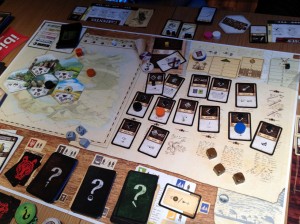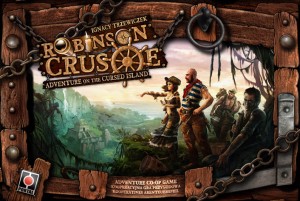Review: Robinson Crusoe
Posted by James (admin) on November 2nd, 2012
 ‘Robinson Crusoe: Adventure on the Cursed Island’ is a co-operative game where players are on a desert island and must fight for their survival whilst trying to achieve a goal (depending upon the scenario being played).
‘Robinson Crusoe: Adventure on the Cursed Island’ is a co-operative game where players are on a desert island and must fight for their survival whilst trying to achieve a goal (depending upon the scenario being played).
Good co-operative games need two very important components. First, the players need to be given interesting/difficult choices so they feel they have input and are playing the game, not merely a passenger. Second, the game must create some random elements (like events) which aren’t too random that they don’t make sense or are overpowered, but also aren’t too predictable or small that they don’t make any difference. Back in the 80’s, Games Workshop released a solo-play game called Chainsaw Warrior which I always hold up as an example of how a game where you play against the game can be done badly. A card deck determined random events but you had little choice and was so random that you could just look through the deck and see if the card order meant you’s almost certainly win or lose.
In Robinson Crusoe, players start on one area of the island with few supplies and little shelter. At the start of each turn, an event occurs such as a wild dog attacking, a player gets bitten by a strange spider, the weather is more rainy than usual – which can be more serious than it sounds, etc. Players then allocate their two action discs to various actions. Action discs can be placed on:
- Regions of the islands – players can gather resources from explored regions, or can explore/reveal unexplored ones
- Various inventions so they can be built and used later – these require resources, other inventions and even certain terrain types have to be discovered to be able to build an invention
- Parts of the camp so the shelter can be built or improvements can be made to the roof (protection from weather), palisade (protection from storms) or weapons (better for fighting beasts)
- Hunting to fight beasts on the island
- Arranging the camp to gain determination tokens and improve team morale
- Resting to gain health
- Threat cards to resolve the threats before they have an adverse effect
As you can see, there are lots of options to pick from and all of them useful. However, this game mechanic is made more interesting because some actions (building, exploring and gathering) can have either 1 or 2 action discs allocated to them. If 2 discs are allocated, the action is an automatic success; however, if only 1 disc is allocated then the player must roll dice to determine the outcome. Not only do the dice dictate if the player succeeds or not, but they also show if the player gets injured and/or if an adventure card must be drawn. There are separate adventure card decks for exploring, building or gathering which makes them contextually relevant too.
This whole system means players not only have to choose what to do with their limited actions, but also how thin or thick to spread them. Do you do a few actions for certain, or do you do lots at the risk of them not being successful and other events happening?
The adventure decks are one of the great things about Robinson Crusoe as they really increase the game’s story-telling. It’s great that complications from adventure cards when building/gathering/exploring are related to building/gathering/exploring. However, it goes a step further because, after the top-half takes effect, the adventure card gets shuffled into the event deck so that the bottom-half of the adventure card will get triggered sometime later when event cards are drawn at the start of each turn. For example, an adventure card in our game said that a wild dog bit me when I was exploring a new region – the card was shuffled into the event deck and later in the game we found the wild dog dead near our camp and got to use its fur. It’s an elegant and effective game mechanic.
Each player has a character which gives them some special abilities, determines the amount of damage they can endure before dying. plus dictates at which points, when they take damage, that they bitch so much that team morale goes down. The Cook is a bit of a whiner. Team morale affects the first player each round and can have a big, draining effect if ignored. Players can gain determination tokens which can be required for the use of some skills.
Once players have resolved all their actions, the night time phase takes place. Players resolve the effect of the weather (cold weather requires wood, and wet weather ruins wood and food). Also, players without a shelter will lose health. Then players need to eat or lose health (and all unused perishable food is useless the next day). The scenario being played determines when the game ends and what the players need to do to win.

Overall, I thoroughly enjoyed Robinson Crusoe. It’s designed by the designer that created Stronghold so I was looking forwards to it, but I enjoyed it even more than I expected. The story-telling is rich and works really well but without pre-determining your actions so much that you feel you’re ‘on rails’. This is created by the mixture of the event deck (which has some nice variety), the adventure cards (which I mentioned above in more detail), and the scenarios which add different objectives, equipment and potential actions.
Each of the 6 scenario cards has a different objective (and each scenario card has a fittingly different, matching visual style). One scenario has players rescuing a (non-player) shipmate who is stranded on a rock and then escaping on a raft which is very different to creating a signal fire, or fighting off cannibals, or a volcanic eruption. This seems like a decent amount of variety, although I hope more will be released too.
With so many actions that need to be taken every turn, the choices are interesting and difficult, plus the events each round and the growing amount of equipment we created meant the choices felt different as the game progressed. We started doing a few actions carefully but quickly realised we needed to speed things up and take more risks. Then, humorously, we discovered we couldn’t take too many risks either as some things were too vital to risk failure. So, the choices to be made were satisfying and challenging, especially as you always want to achieve more each turn than you’re able.
The game can be played solo (Friday and the dog characters join you to help you by adding action discs), but you could also play solo as if you were multiple players too.
In the end, Robinson Crusoe is an excellent co-operative game with lots of tough choices, different possible options and a really strong desert island feeling. It allows players to form a plan, gather equipment/resources, and choose how to prioritise and respond to threats without seeming random.
James.
[Played with 4 players]

